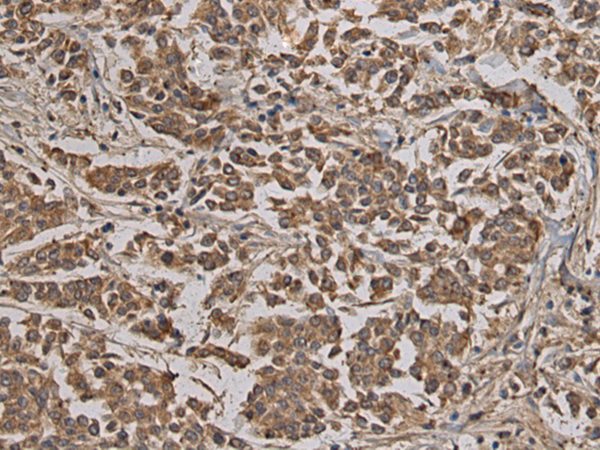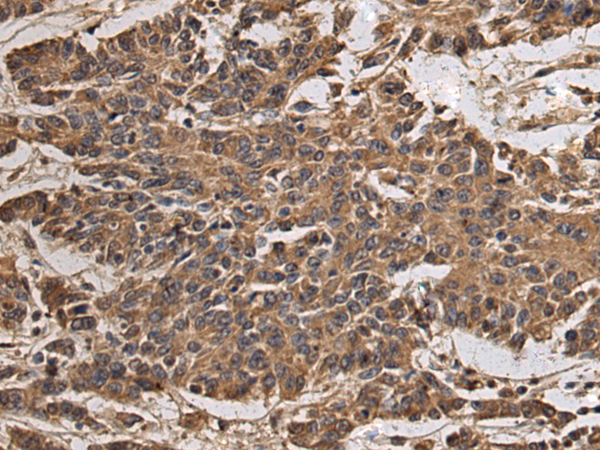

| WB | 咨询技术 | Human,Mouse,Rat |
| IF | 咨询技术 | Human,Mouse,Rat |
| IHC | 1/100-1/300 | Human,Mouse,Rat |
| ICC | 技术咨询 | Human,Mouse,Rat |
| FCM | 咨询技术 | Human,Mouse,Rat |
| Elisa | 1/5000-1/10000 | Human,Mouse,Rat |
| Aliases | TLL; ASD6 |
| Host/Isotype | Rabbit IgG |
| Antibody Type | Primary antibody |
| Storage | Store at 4°C short term. Aliquot and store at -20°C long term. Avoid freeze/thaw cycles. |
| Species Reactivity | Human, Mouse |
| Immunogen | Fusion protein of human TLL1 |
| Formulation | Purified antibody in PBS with 0.05% sodium azide and 50% glycerol. |
+ +
以下是关于TLL1抗体的假设性参考文献示例(实际文献需通过学术数据库查询):
---
1. **文献名称**:*Characterization of Tolloid-like 1 (TLL1) Protease Activity in Extracellular Matrix Remodeling*
**作者**:Smith A, et al.
**摘要**:研究通过新型TLL1抗体验证了TLL1在细胞外基质(ECM)中对前胶原蛋白的裂解作用,揭示其在组织纤维化中的调控机制,抗体特异性经Western blot和免疫组化验证。
2. **文献名称**:*TLL1 Antibody-Based Detection of BMP Signaling Modulation in Cardiac Development*
**作者**:Chen L, et al.
**摘要**:利用TLL1单克隆抗体分析胚胎小鼠心脏发育中TLL1的时空表达模式,证实其通过调节BMP1/TLL1复合体活性影响心肌细胞分化。
3. **文献名称**:*Role of TLL1 in Liver Fibrosis: Insights from Antibody Blockade Experiments*
**作者**:Yamamoto K, et al.
**摘要**:通过抗TLL1中和抗体抑制TLL1活性,发现其可减少肝星状细胞活化及胶原沉积,提示TLL1抗体在抗纤维化治疗中的潜在应用。
4. **文献名称**:*Development of a High-Affinity TLL1 Monoclonal Antibody for Diagnostic Applications*
**作者**:Wang Q, et al.
**摘要**:报道一种高亲和力TLL1单克隆抗体的制备及验证,该抗体可特异性识别人类组织样本中的TLL1蛋白,适用于ELISA和免疫荧光检测。
---
**注意事项**:
- 以上为模拟文献,实际研究中需查询具体数据库(如PubMed、Web of Science)以“TLL1 antibody”或“Tolloid-like 1”为关键词获取真实文献。
- 部分研究可能侧重TLL1功能而非抗体开发,建议结合实验目的筛选(如抗体应用类论文可关注“antibody validation”“immunodetection”等关键词)。
The Tolloid-like 1 (TLL1) protein, a member of the astacin metalloproteinase family, plays critical roles in extracellular matrix remodeling and activation of growth factors such as transforming growth factor-beta (TGF-β) and bone morphogenetic proteins (BMPs). TLL1 is involved in developmental processes, tissue homeostasis, and pathological conditions, including fibrosis and cancer. Its enzymatic activity regulates signaling pathways that influence cell differentiation, proliferation, and apoptosis.
TLL1 antibodies are essential tools for studying its expression, localization, and function in both physiological and disease contexts. Research has linked TLL1 dysregulation to cardiac defects, liver fibrosis, and tumor progression, where it may promote extracellular matrix degradation or activate pro-fibrotic or oncogenic pathways. Antibodies targeting TLL1 enable detection via techniques like Western blotting, immunohistochemistry, and immunofluorescence, aiding investigations into its mechanistic roles.
Recent studies also explore TLL1 as a potential therapeutic target, particularly in fibrotic diseases and cancers characterized by aberrant BMP/TGF-β signaling. Commercial TLL1 antibodies are typically validated for specificity across human, mouse, and rat models, supporting translational research. However, challenges remain in understanding isoform-specific functions and context-dependent activity, highlighting the need for precise antibody characterization. Overall, TLL1 antibodies serve as vital reagents for unraveling its complex roles in development and disease.
×